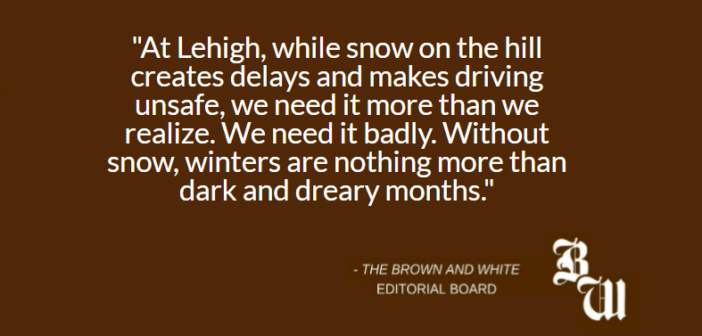It was the hottest day ever recorded on the world’s most southern continent. Here’s why that’s disturbing — you shouldn’t be able to walk around Antarctica without a jacket. Sixty-five degrees, on a continent that is entirely ice, is just terrifying.
It’s nearly mid-February in Bethlehem, and there’s no snow on the ground. No major storms, nothing on the horizon. You might be from a place where winters don’t feature whiteout conditions, but in the Northeast, this is wrong. And it’s concerning.
According to NASA and NOAA, 2019 was the second-hottest year ever recorded. And the last decade was the hottest ever recorded. The planet has warmed nearly 2 degrees compared to mid-20th century temperatures.
This information may be painful to note for fans of winter sports and mountain destinations. And for everyone else, just look around the world at the effects of global warming.
For one, wildfires have ravaged different corners of the globe, from the United Kingdom to California, and most recently in Australia, where bushfires have devastated the continent, leaving at least 33 people dead.
Record carbon dioxide emissions have been reported, and the last 10 years alone in the U.S. have seen the disastrous effects of climate change. Droughts in the Rockies, storms in the Midwest and hurricanes tearing up the eastern coast have all racked up hundreds of billions of dollars in damages.
In Greenland last year, widespread melting marked an unusual stretch that contributed to rising sea levels.
Scientists have predicted that if the West Antarctic Ice Sheet was to melt, global sea levels would be raised by over 10 feet. Sixty five degrees on a continent that is entirely ice is quite alarming and should be looked at with utmost seriousness.
In that regard, countries are joining together to acknowledge, if not fight, the concerning trends we’re facing. On Earth Day in 2016, 175 world leaders signed the Paris Agreement, marking the largest number of countries to sign an international agreement on a single day.
When all these disastrous events are setting records in the last few years, at the very least, the international community came together to set a new record.
On top of this, you have voices like that of Greta Thunberg, the 17-year-old Swede who has been an outspoken advocate for climate awareness. Perhaps the younger generation of activists may be the ones to figure out how to reduce the speed at which our footprint is causing chaos.
At Lehigh, while snow on the hill creates delays and makes driving unsafe, we need it more than we realize. We need it badly. Without snow, winters are nothing more than dark and dreary months.
With the temperature hitting nearly 50 degrees for a few days this week, a trend that’s been familiar for months now, we might not see any big blizzards this winter.
You may hate winters, but we really do need snow. A February in the Northeast without snow is not normal. For students who come from relatively snow-free areas like the southern states, this might not seem like a big deal.
For students from northern parts of the country, this may be the most disappointing winter yet. Long-gone are the whiteouts and monster blizzards that give travelers headaches, it would appear. Other parts of the country are still enjoying the winter classics, but here, this is just weird.
Winter-haters rejoice, but this is not a good sign. Increasing temperatures and abnormal seasons are just a sign that things are getting worse. When the Greta Thunbergs of the world talk, we should be listening.






Comment policy
Comments posted to The Brown and White website are reviewed by a moderator before being approved. Incendiary speech or harassing language, including comments targeted at individuals, may be deemed unacceptable and not published. Spam and other soliciting will also be declined.
The Brown and White also reserves the right to not publish entirely anonymous comments.